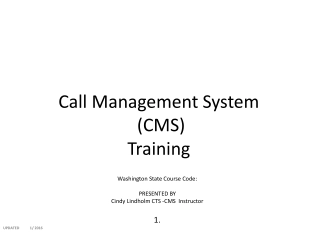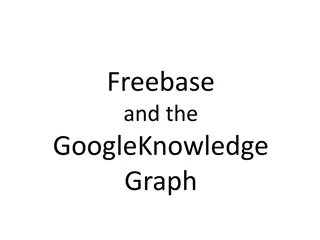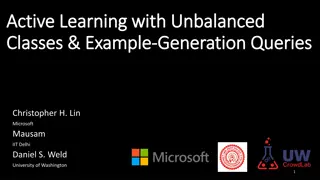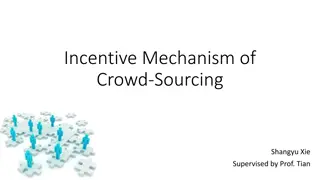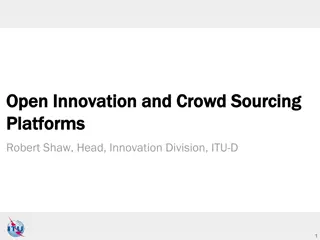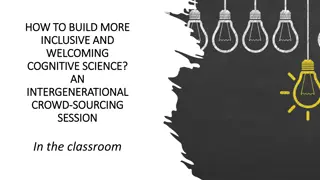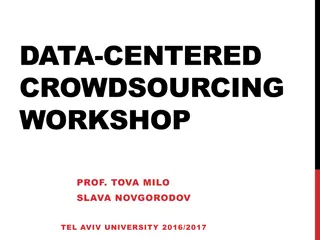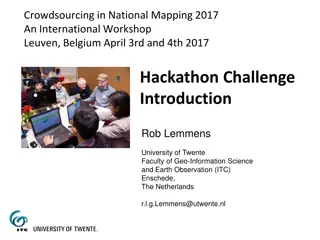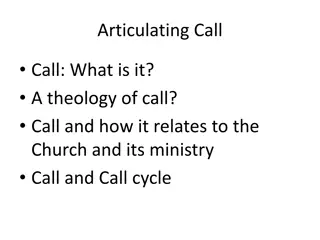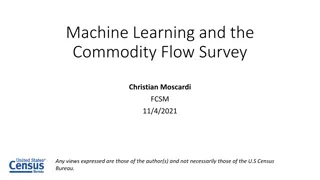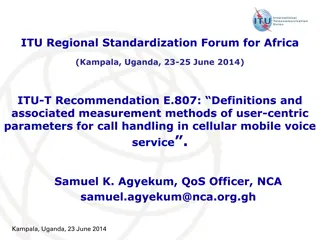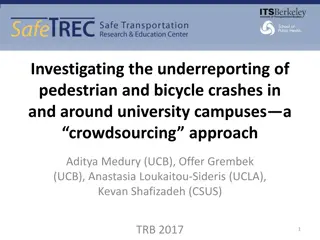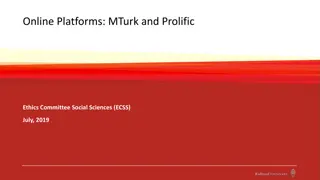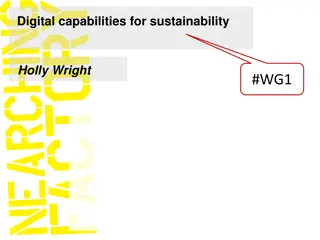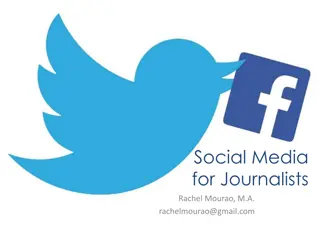Crowdsourcing in CALL: Applications and Implications
Explore the diverse applications of crowdsourcing in Computer-Assisted Language Learning (CALL) within technological, social, and ethical contexts. Uncover success stories in areas like administration, business, medicine, and more. Delve into how crowdsourcing impacts education, language learning, and user contributions, along with ethical considerations and the role of intrinsic and extrinsic motivators in fostering participation. Discover the technologies used based on surveys conducted with student teachers and secondary school learners.
Download Presentation

Please find below an Image/Link to download the presentation.
The content on the website is provided AS IS for your information and personal use only. It may not be sold, licensed, or shared on other websites without obtaining consent from the author.If you encounter any issues during the download, it is possible that the publisher has removed the file from their server.
You are allowed to download the files provided on this website for personal or commercial use, subject to the condition that they are used lawfully. All files are the property of their respective owners.
The content on the website is provided AS IS for your information and personal use only. It may not be sold, licensed, or shared on other websites without obtaining consent from the author.
E N D
Presentation Transcript
CALL in varied technological, social and ethical contexts El bieta Gajek Institute of Applied Linguistics University of Warsaw 8th December 2021
SocialContext on the exampleof crowdsourcing There are examples of success of crowdsourcing in Administration Arts and humanities Business Cultural heritage preservation E-democracy Governance Fashion industry Marketing Medicine Open innovation Crowdfunding Crowdvoting Crowdsolving Microwork Macrowork (Netflix Prize)
Crowdsourcing in education A component of Massive open online courses (MOOCs) Open Educational Resources Khan Academy Wikipedia enetCollect COST project - closed COST Action CA16105
Extention of CALL - crowdsourcing There is a need for new approaches to foster the language learning of people of various cultural, educational, linguistic and socio-demographic backgrounds. Duolingo Buusu Memrise Amara (subtitling) Partially commercial: Babbel, Kahoot, Quizlet, Quizizz, Roseta Stone, Elsa Many Apps (appearing and disappearing LiveMocha, WikiSpaces) which may include artificial intelligence try-out and critically evaluate Potential ERRORS and low quality content COST Action CA16105
Forms of contribution As a user (e.g. translate.google, duolingo, etc.) As an active contributor: creator of content, feedback giver, gamer providing professional content without being paid explicitly. Instead Extrinsic motivators and incentives are applied: financial, social and organizational Intrinsic motivators are predominant: charity, competence, desire to solve, enjoyment, fun, pleasure, self-satisfaction, altruism, autonomy
Ethical perspective In enetCollect Explicit crowdsourcing people know that they create content (e.g. adding translation to translate.google, duolingo, giving feedback) Do people know what they do? Do people know what app s owners do with their data? Implicit crowdsourcing people do not know that they participate in a crowdsourcing activity, e.g. re-CAPTCHA
6/12/2018 What technologies are used? Surveys on Polish student teachers and secondary school learners 1st survey 98 students participated aged (21-23), F 81.60%, M 18.4% 2nd survey - 58 students participated (the results are presented and discussed in another paper submitted collaboratively for this conference) aged (18-25), F 79.3%, M 20.4% 3rd survey - 75 secondary school learners participated aged (16-18), F 73.3%, M 14.7%, prefer not to say 12% COST Action CA16105
University students and Secondary School learners answers What do they use? Kahoot (78.7%) (58.6%), Wikipedia (66.7%) (89.7%), Duolingo (52%) (81%), KhanAcademy (36%) (15%), Where do they use the tools? Outside the class (80%) (94.8%), in class (49.3%) (48.3%), Do they play games? No (42.7%) (33.8%), once a month (9.3%) (27.6%), every day (10.7%) (5.2%), Why do they use games? for having fun (66.7%) (84.5%), as part of the class activity (14.7%) (51.7%), for doing what others do (12%) (25.9%), What devices do they use? smartphone (97.3%) (98.3%), laptop (70.7%) (94.8%), Do they add any content to websites/apps they use? No (74.7%) (60.3%),
6/12/2018 Survey on Polish student teachers 98 students participated by filling in a questionnaire on paper 26% had been familiar with the term crowdsourcing before the survey 22% had been able to make links with crowsourcing and language learning 74% use Wikipedia for language learning 76% want to implement innovative pedagogical concepts in their teaching 90% of them think that a crowd can prepare a high quality content 3% think that CS is a form of cheating as people are not paid for their work 81% want to learn more about CS in language learning COST Action CA16105
University students and Secondary School learners answers Selected results are presented in detail to show answers to the following questions: 1. What kind of feedback motivates students and SS learners to continue using the websites? 2. What is their reaction to being watched by the app/website they use? 3. What do they think about being recorded by the app/website they use? 4. How do they respond to errors noticed in the app/website?
Feedback as a motivator for SS learners Correction of clarity of expression Tips encouraging me for self correction Some gamified prize to encourage me
Feedback as a motivator for Students Suggestion of a new exercise/task stimulating further development
If you know that the program is watching the permission) are you willing to continue using the programme anyway ? watching you (though you never gave SS learners Students
What is your reaction/attitude to the fact that your interactions with a programme are RECORDED RECORDED and analysed without your permission? SS learners Students
How likely are you to forgive errors in apps/programmes? SS learners Students
Are you willing to correct these errors SS learners Students
6/12/2018 To conclude Students and secondary school learners present similar attitudes and opinions but Teenagers are less tolerant to being watched and recorded by the app/website without permission. They are more teacher dependent in the case of errors noticed in the app/website They will accept a variety of linguistic feedback given by the app/website They are not heavy gamers COST Action CA16105
enetCollect survey on teachers WG1 survey on teachers w launched 11/06/2018, closed 01/02/2019 16241 teachers got interested in the survey with 1127 respondents, from 37 countries, who completed it. The survey was designed to collect data on current practices: a. Are teachers familiar with the concept of crowdsourcing? b. Are they including crowdsourcing in their teaching? c. Are they themselves active in crowdsourcing activities? d. If yes,what are these activities? e. What is their attitude towards crowdsourcing in general? f. What would motivate them to include crowdsourcing into their teaching? COST Action CA16105
Summary of the results of the teacher survey The findings show that teachers preceive CS as a form of CALL. They prefer the explicit crowdsourcing. Teachers are interested in using CS in their practice are willing to try need more information about CS need more practical guidelines need tutorials and examples COST Action CA16105
6/12/2018 General conclusion We no longer talk about computer literacy of the users or access to devices as in early CALL. Focal points embrace: Interactions with apps/websites Ethical issues protection of user data Quality of the materials for learning and teaching User motivations to continue learning with the app/website Critital thinking COST Action CA16105
Selected examples of teaching procedures in language teaching and learning Texts on crowdsourcing, new technological solutions and ethical issues for devloping reading and listening A video on crowdsourcing, new technological solutions and ethical issues as a base for taking about experiences and opinions for developing speaking Tools: Duolingo, Buusu, Memrise, Writeandimprove, Speakandimprove to emphasise the importance of ethical issues International collaborative projects such as Safer Internet Day to raise the ethical awareness Squiffy or TADS (Text Adventure Development System) for a school newspaper or debates on the importance of ethical awareness in the use of materials for language learning
Obstacles and barriers New social practices are controversial as teachers needs to reshape their habits and there is no prior academic proof of their effectiveness Digital technologies had been rejected or avoided by the majority of language teachers since 1980 (1950) until the Covid19 pandemic Methodology skills of teaching online are still developing New challenge, that is raising ethical awareness, has become extremely important in the era of unethical practices of media providers spreading fake news, selling the users data and targeting commercial and political advertisements at individuals New educational solutions are introduced into the school curricula with delay which demotivates users to try them out
Recommendations Pursue educational innovations - catch up with the novelties Develop critical thinking skills in yourself and in your learners Mind and unveil ethical concerns and unethical practices Observe habits and motivations of your learners Try out, reflect on and critically evaluate your experiences
References Arhar Holdt, ., Zviel-Girshin, R., Gajek, R., Dur n-Mu oz, I., Bago, P., Fort, K., Hatipoglu, C., Kasperavi ien , R., Koeva, S., Lazi Konjik, I., Miloshevska, L., Ordulj, A., Rodosthenous, Ch., Volodina, E., Weber, T., Zanasi, L.(2020). Language Teachers and Crowdsourcing: Insights from a Cross-European Survey. Rasprave: asopis Instituta za hrvatski jezik i jezikoslovlje, Vol. 46 No. 1, 2020 str.1-28. https://doi.org/10.31724/rihjj.46.1.1 https://hrcak.srce.hr/243065 Gajek, E. (2020) Crowdsourcing in language learning as a continuation of CALL in varied technological, social, and ethical contexts In K.-M. Frederiksen, S. Larsen, L. Bradley, and S. Thou sny (eds.) CALL for widening participation: short papers from EUROCALL 2020 10.14705/rpnet.2020.48.1168 https://doi.org/10.14705/rpnet.2020.48.1168 75-80. Hatipo lu, C., Gajek, E., Miloshevska, L., Delibegovi D ani N. (2020) Crowdsourcing for widening particpation and learning opportunities: a view from language learners window In K.-M. Frederiksen, S. Larsen, L. Bradley, and S. Thou sny (eds.) CALL for widening participation: short papers from EUROCALL 2020 10.14705/rpnet.2020.48.1169 81-87 Gajek, E., Zdravkova, K.(2020) Preparing Teachers for Crowdsourced Language Learning. Infotheca- Journal for Digital Humanities 20(1-2) pp 7-26. https://doi.org/10.18485/infotheca.2020.20.1_2.1


